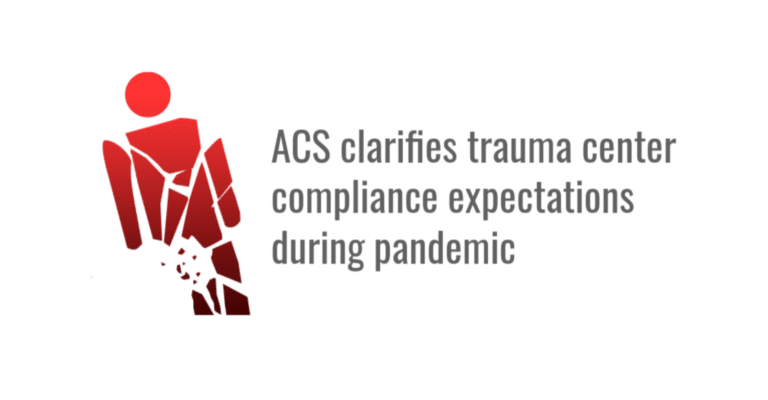COVID-19 has made it harder for many trauma programs to maintain compliance with the verification standards of the American College of Surgeons (ACS). In a recent webinar, the ACS clarified its expectations around Orange Book compliance during the pandemic.
The webinar — “COVID-19 Impact on Trauma Center Verification” — was hosted by Megan Hudgins, a program coordinator in the Verification, Review, and Consultation (VRC) Program.
Hudgins provided a detailed explanation of the college’s recent Clarification of the Verification Extension and Site Visit Postponement. She also provided guidance on how the ACS will handle compliance issues during COVID-19.
The VRC may issue “provisional allowances”
Hudgins noted that several trauma program leaders contacted the VRC about specific compliance obstacles. “Recurring areas of concern” among trauma leaders include:
- Trauma program staffing reductions due to furloughs
- Decreases in trauma patient volume
- The difficulty of holding PI meetings routinely
- The conversion of trauma bays to COVID care units
- The cancellation of educational courses required for provider credentialing
According to Hudgins, VRC leaders understand that COVID-19 has impacted hospital resources and affected their ability to maintain compliance with ACS verification standards.
“We want to make you aware that at the VRC’s discretion, provisional allowances may be issued,” she said. “These will be given on a case-by-case basis and are subject to approval from the VRC chairs.”
Hudgins suggested that ACS reviewers will be sympathetic to the difficulties faced by trauma programs during the pandemic.
“Our reviewers have also been impacted by COVID-19 at their centers and will have an understanding of challenges programs may have endured during this time,” she said.
Trauma program leaders who believe they will have difficulty meeting any standards should contact the VRC at cotvrc@facs.org.
Documenting your COVID response is advisable
The webinar also addressed a question about whether ACS reviewers will examine a trauma program’s COVID-19 response. For trauma centers undergoing a site review next year, will program leaders need to demonstrate how their program handled the pandemic?
According to Hudgins, the ACS does not have a specific requirement regarding demonstration of a center’s pandemic response. However, it makes sense to have documentation available.
“It would certainly be advised to have documentation of the program’s COVID-19 response available on site for the review team,” she said. “If anything, it certainly could reflect well on the program’s disaster management capabilities and PI program.”
Teleconferencing is acceptable for PI meetings
Several trauma program leaders expressed concerns about PI meeting participation during the pandemic. With social distancing as a goal, is remote participation via teleconference acceptable?
According to Hudgins, teleconferencing is an acceptable alternative for peer review and other PI meetings.
“While under normal circumstances we do ask to limit the overuse of teleconferencing for participation in PI meetings, we also acknowledge that these are not normal circumstances,” she said.
“The ACS does approve of the use of teleconferencing for PI meetings,” she said, “just in order to ensure that the addressing of quality of care concerns doesn’t come to a halt during this time.”

